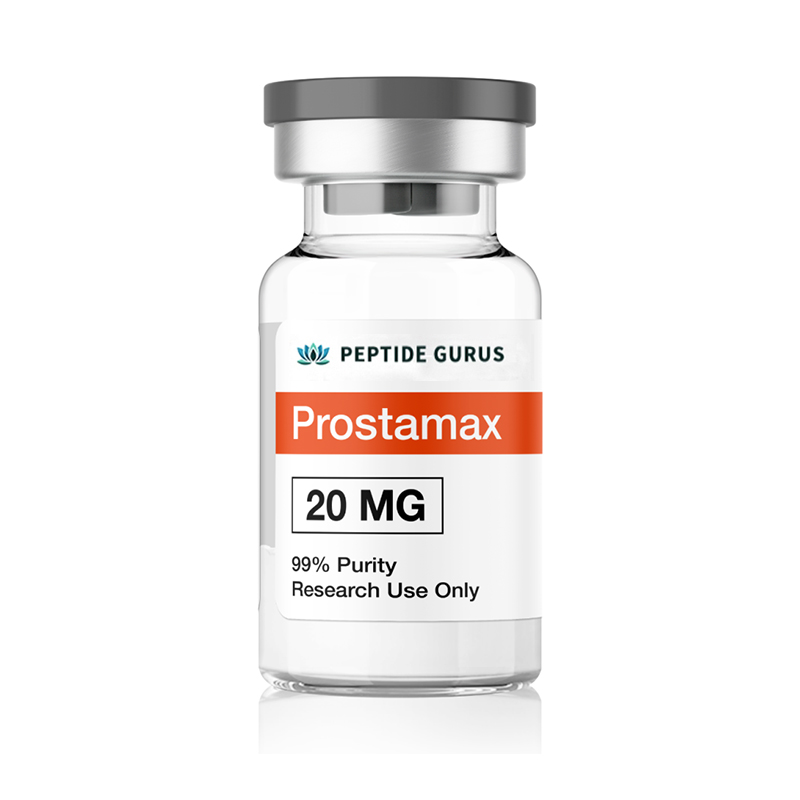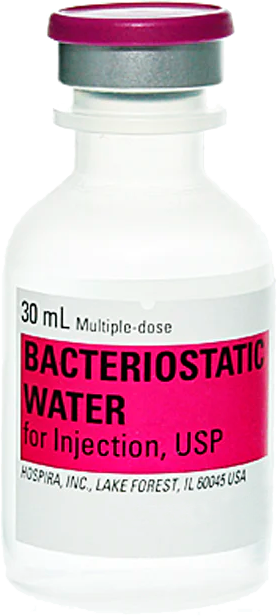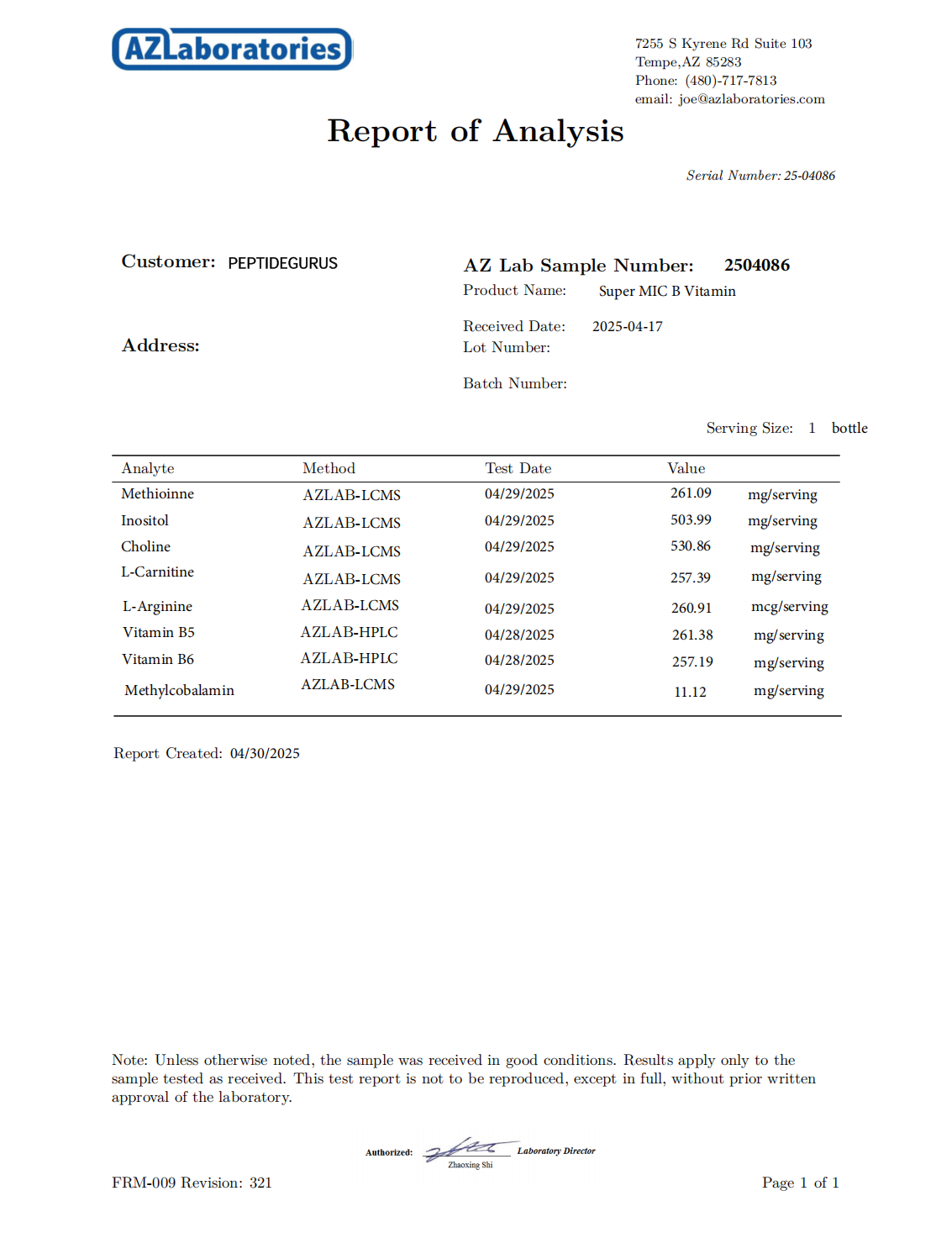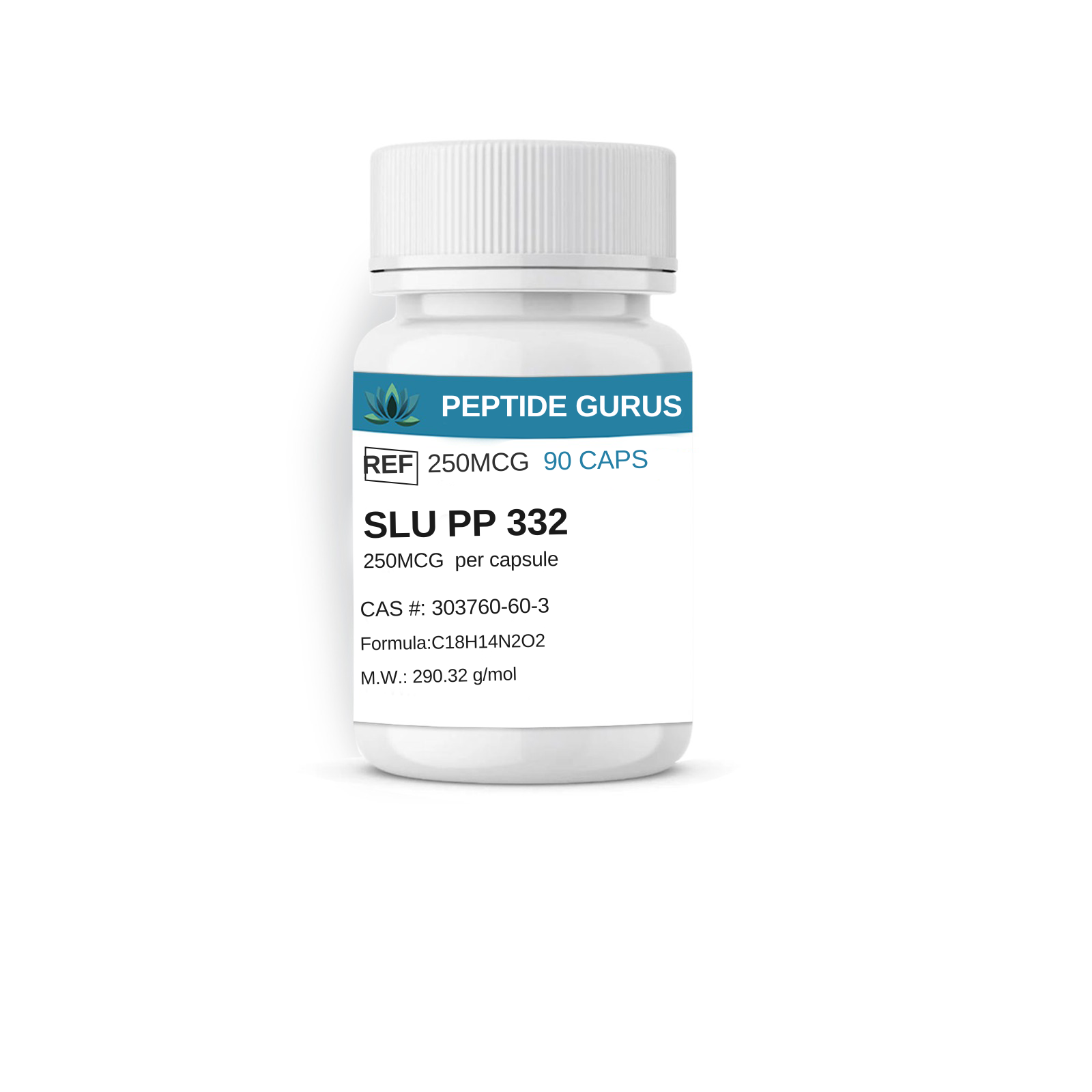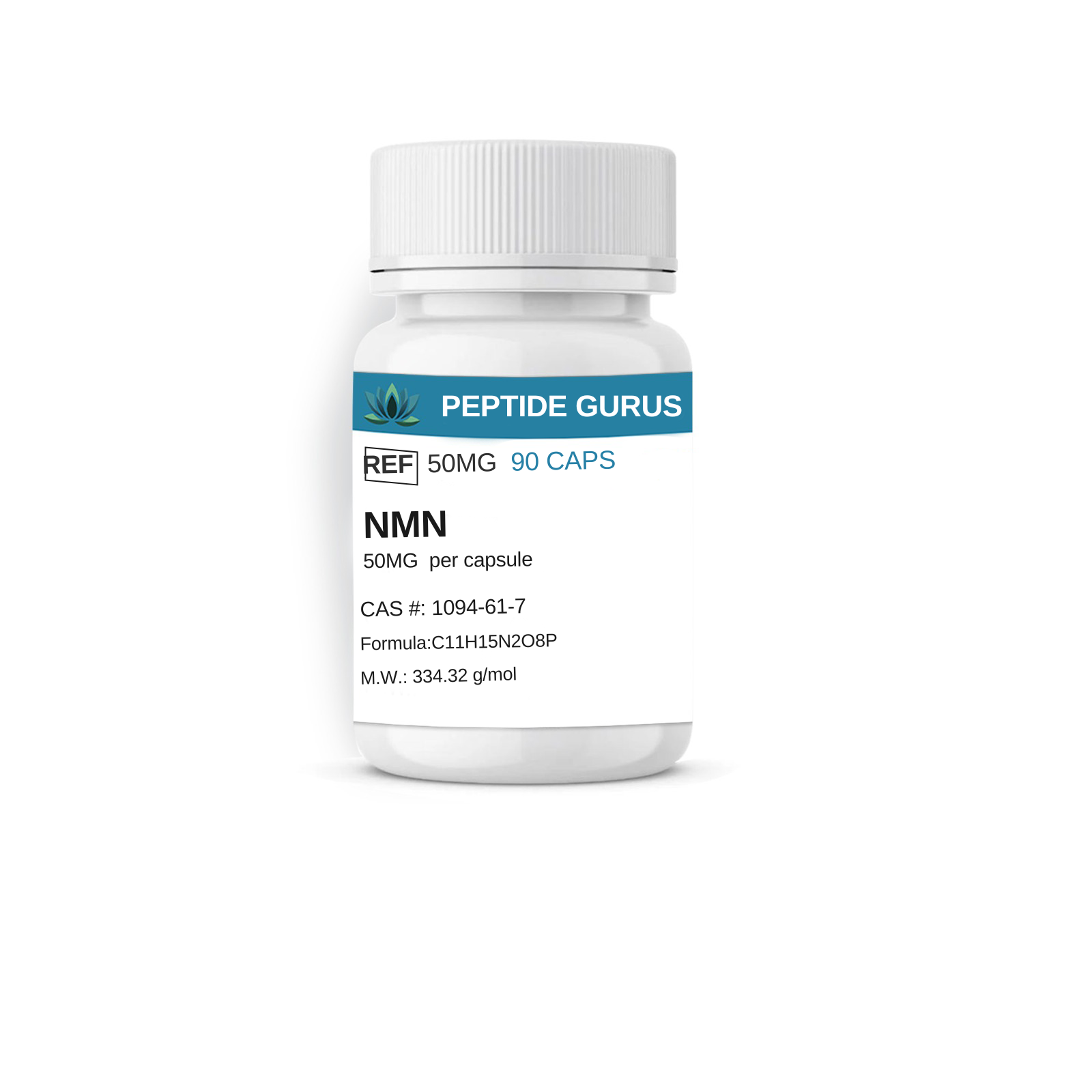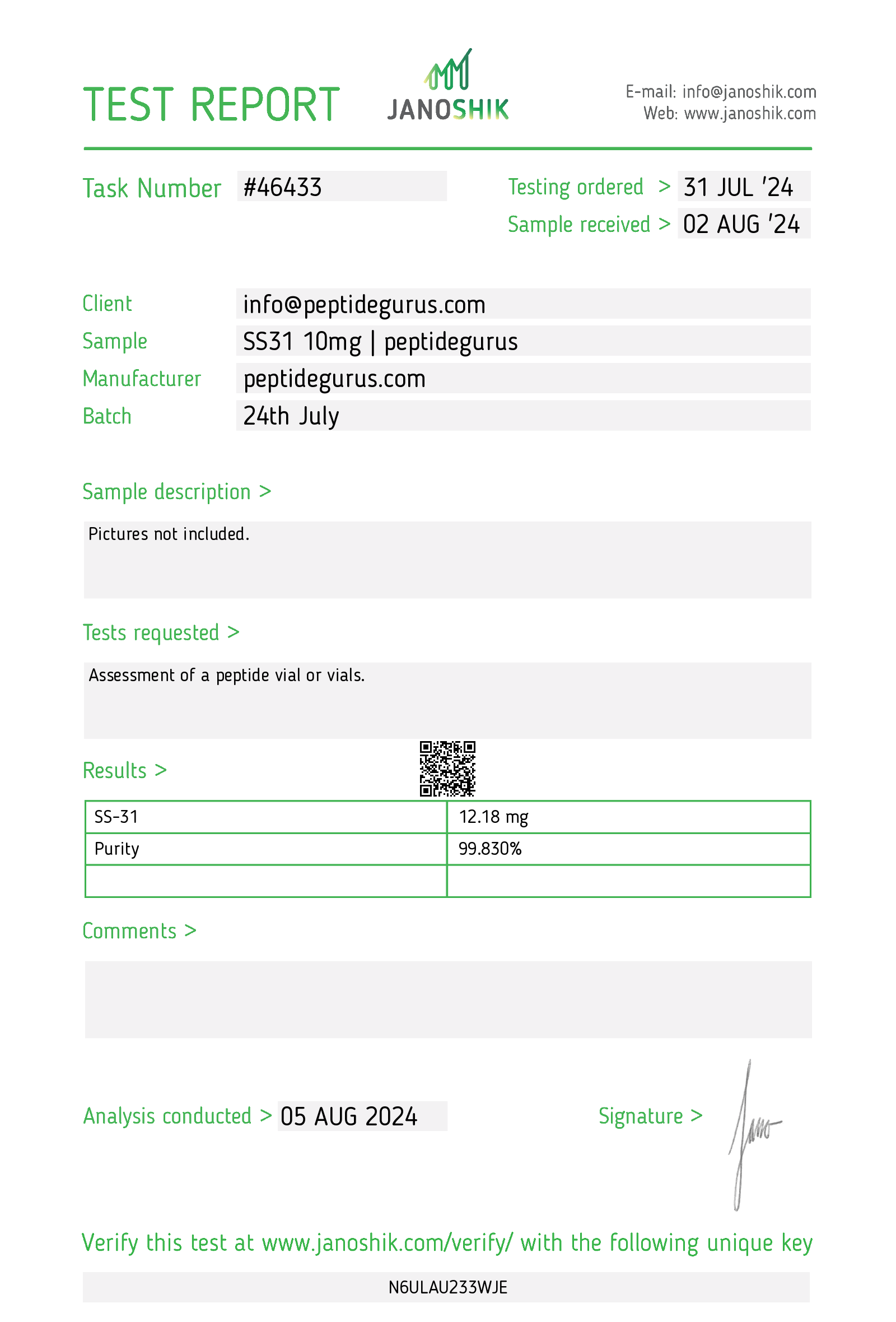Free (1) 30 ml Bacteriostatic Water
with qualified orders over $500 USD.
(excludes capsule products, cosmetic peptides, promo codes and shipping)
Prostamax is a synthetic Khavinson bioregulator peptide with profound effects on DNA condensation in a number of cells. While it is primarily of interest for its anti-aging and anti-inflammatory effects on the prostate, Prostamax has also been shown to optimize function of a number of cells within the body (e.g. lymphocytes) by altering epigenetic controls on DNA.
Product Usage: This PRODUCT IS INTENDED AS A RESEARCH CHEMICAL ONLY. This designation allows the use of research chemicals strictly for in vitro testing and laboratory experimentation only. All product information available on this website is for educational purposes only. Bodily introduction of any kind into humans or animals is strictly forbidden by law. This product should only be handled by licensed, qualified professionals. This product is not a drug, food, or cosmetic and may not be misbranded, misused or mislabled as a drug, food or cosmetic.
Prostamax
Prostamax is a synthetic Khavinson peptide with primary repair effects in the prostate[1]. The peptide has also been shown to improve lymphocyte function and alter DNA expression patterns in other tissues. Prostamax is considered to be one of the broader-spectrum anti-aging Khavinson peptides because it promotes decondensing of heterochromatin in a large variety of cells. Research in rats indicates that Prostamax may be useful in the treatment of chronic prostatitis. There is speculation that long-term use may ward off cancer, though studies of sufficient length to demonstrate this have not yet been performed.
Prostamax Structure
Amino Acid Sequence: Lys-Glu-Asp-Pro (KEDP)
Molecular Formula: C20H33N5O9
Molecular Weight: 487.5 g/mol
PubChem CID: 9848296
Synonyms: SCHEMBL6660498
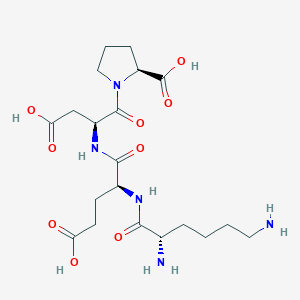
Prostamax and the Prostate
Chronic prostate inflammation (called chronic prostatitis) affects as many as 16% of men at some point in their lives. It is a painful condition causing burning with urination, urgency, and trouble voiding. It can even cause difficult or painful ejaculation along with pain in the lower back. It is notoriously difficult to treat, often requiring long-term antibiotic treatment over months. There is also good evidence to suggest that it can lead to cardiovascular disease and even cancer, so treating prostatitis is crucial to long-term health[2].
Research in rat models shows that prostatitis can be treated with Prostamax, which reduces the signs and symptoms of the disease. Rats treated with Prostamax for just 15 days showed reduce swelling of the prostate gland along with less vascular congestion (hyperemia) and less infiltration by cells of the immune system. Interestingly, the rats also showed decreased levels of scarring in the prostate, indicating that the reduction in inflammation was slowing or even stopping pathological remodeling. Though the study was not carried out long enough or on enough rats to assess Prostamax’s effect on the risk for cancer, the results suggest that it would likely diminish the risk by reducing chronic inflammation that leads to pathological hypertrophy and hyperplasia[3].
According to Dr. Angelina Pakhomova, what makes the above study on Prostamax extra exciting is that it was effective in treating a form of prostatitis called chronic abacterial prostatitis (CAP). CAP is the most common form of prostatitis, but it is difficult to treat because it isn’t caused by a bacterial infection. Bacterial infections respond readily to antibiotics. CAP, on the other hand, does not respond as well to antibiotic treatment and sometimes doesn’t respond at all. It is also more likely to recur and has been shown to be exceptionally frustrating to those who suffer from it. Having an alternative treatment that is effective in CAP could improve quality of life for many men and ward off future disease. Finding a treatment for CAP is more important than ever as rates of the condition have increased almost 3-fold since the end of the 20th century.
Prostamax and the Immune System
Though Prostamax is considered to be tissue-specific, there is ample evidence that the bioreulator acts on cells outside of the prostate. The most consequential effects are on the ribosomes and densely packed chromatin found in lymphocytes. In these cells, Prostamax, like Epithalon and Vilon, serves to increase expression of ribosomes which are responsible for the translation of mRNA into proteins. It also opens up densely packed chromatin to make genes more accessible for transcription into mRNA. Thus, Prostamax sets the stage for increased gene expression at every level, allowing for a functional change in the health of lymphocytes[4], [5].
The impact of Prostamax on the immune system is not just theoretical either. Research shows that the peptide helps to reduce signs of chronic prostate inflammation including swelling, hyperemia, and lymphocyte infiltration.[3] This results both from the influence Prostamax has on lymphocytes and their control over the immune response as well as the role the peptide plays in normalizing growth and differentiation of prostate cells.
Prostamax and Aging
The effects that Prostamax has on lymphocytes and cells of the prostate are part of a larger effect it has one many different types of cells. Research in cell cultures taken from older individuals shows that Prostamax alters DNA structure by decondensing heterochromatin. This, in turn, allows for greater expression of DNA that was inactivated via dense packaging of DNA[6].
What makes this remarkable in terms of aging is that condensation of DNA is a normal, if undesirable, consequence of aging. DNA condensation is a primary driver of both senescence and apoptosis, making it one of the most important mechanisms of aging. By unpacking DNA, Prostamax is literally giving the cells a more youthful genetic profile. The results are increased proliferation of cells, decreased apoptosis (programmed cell death), and improved protein expression and cell function.
Interestingly, Prostamax and similar epigenetically active peptides are found naturally in long-lived rodent species like the African mole rat. These same peptides are not found in short-lived species[7]. This indicates that the epigenetic effects that have been observed with peptides like Prostamax are, in fact, directly related to aging and longevity.
Prostamax Summary
Prostamax is a synthetic Khavinson peptide with profound effects on DNA condensation in a number of cells. While it is primarily of interest for its anti-aging and anti-inflammatory effects on the prostate, Prostamax has also been shown to optimize function of a number of cells within the body (e.g. lymphocytes) by altering epigenetic controls on DNA.
Article Author
The above literature was researched, edited and organized by Dr. E. Logan, M.D. Dr. E. Logan holds a doctorate degree from Case Western Reserve University School of Medicine and a B.S. in molecular biology.
Scientific Journal Author

Prof. Vladimir Khavinson is being referenced as one of the leading scientists involved in the research and development of Prostamax. In no way is this doctor/scientist endorsing or advocating the purchase, sale, or use of this product for any reason. There is no affiliation or relationship, implied or otherwise, between
Referenced Citations
- A. N. Zakutskiĭ, N. I. Chalisova, G. A. Ryzhak, A. I. Aniskina, S. V. Filippov, and P. N. Zeziulin, “[The tissue-specific effect of synthetic peptides-biologic regulators in organotypic tissues culture in young and old rats],” Adv. Gerontol. Uspekhi Gerontol., vol. 19, pp. 93–96, 2006.
- “Treating chronic prostatitis,” Harvard Health, Dec. 21, 2017. https://www.health.harvard.edu/mens-health/treating-chronic-prostatitis (accessed Feb. 22, 2022).
- T. G. Borovskaya et al., “Experimental studying of the drug efficiency Prostamax in the therapy of chronic aseptic prostatitis and its complications,” Mod. Res. Inflamm., vol. 2013, Jul. 2013, doi: 10.4236/mri.2013.23007.
- V. K. Khavinson, T. A. Lezhava, and V. V. Malinin, “Effects of short peptides on lymphocyte chromatin in senile subjects,” Bull. Exp. Biol. Med., vol. 137, no. 1, pp. 78–81, Jan. 2004, doi: 10.1023/b:bebm.0000024393.40560.05.
- T. Meskhi et al., “[The influence of the peptide bioregulator prostamax on heterochromatin of human lymphocytes in situ],” Biofizika, vol. 49, no. 6, pp. 1091–1093, Dec. 2004.
- T. A. Dzhokhadze, T. Z. Buadze, M. N. Gaĭozishvili, N. A. Baratashvili, and T. A. Lezhava, “[Deheterochromatinization of the chromatin in old age induced by oligopeptide bioregulator (Lys-Glu-Asp-Pro)],” Georgian Med. News, no. 212, pp. 76–82, Nov. 2012.
- V. K. Khavinson, D. Y. Kormilets, and A. T. Mar’yanovich, “Peptides (Epigenetic Regulators) in the Structure of Rodents with a Long and Short Lifespan,” Bull. Exp. Biol. Med., vol. 163, no. 5, pp. 671–676, Sep. 2017, doi: 10.1007/s10517-017-3876-x.
ALL ARTICLES AND PRODUCT INFORMATION PROVIDED ON THIS WEBSITE ARE FOR INFORMATIONAL AND EDUCATIONAL PURPOSES ONLY.
The products offered on this website are furnished for in-vitro studies only. In-vitro studies (Latin: in glass) are performed outside of the body. These products are not medicines or drugs and have not been approved by the FDA to prevent, treat or cure any medical condition, ailment or disease. Bodily introduction of any kind into humans or animals is strictly forbidden by law.


